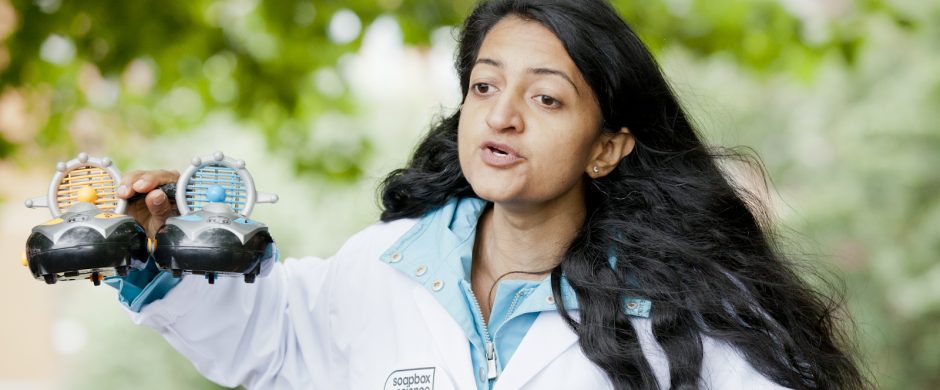 Elizabeth is a Lecturer in the School of Engineering and Informatics at the University of Sussex. In her career she has travelled around the world, working in different fields of engineering. Elizabeth will be explaining her current research at Soapbox Science Brighton on 2nd June 11am-2pm with her talk “Are robots the future for medicine and health care?” Thanks to the School of Engineering and Informatics for supporting Elizabeth’s talk.
Elizabeth is a Lecturer in the School of Engineering and Informatics at the University of Sussex. In her career she has travelled around the world, working in different fields of engineering. Elizabeth will be explaining her current research at Soapbox Science Brighton on 2nd June 11am-2pm with her talk “Are robots the future for medicine and health care?” Thanks to the School of Engineering and Informatics for supporting Elizabeth’s talk.
SS: What attracted you to Soapbox Science in the first place – and what are you most looking forward to/excited about in taking part?
ERM: As female scientist, I would like to share my research with a non-specialized audience, as I believe that the general public needs to know that the UK needs more Engineers to help solve some of the challenges in the healthcare system. Soapbox science is the perfect outreach event to communicate that.
My research is about novel technology developments based on electronics and sensors to develop future medical robots. This will assist doctors and nurses to perform, for example precision surgery. I am especially targeting young female students as we need more women in Engineering given that in the UK we are only 9% of the total working workforce.
SS: Tell us about your career pathway
ERM: I am engineer scientist who is passionate about Cardio-engineering and Robotics for health-care. I was born in Mexico, were I completed my BSc degree in Telecommunications Engineering at National University of Mexico, I did a Master degree at ITAM/TELECOM Bretagne in France. Through my PhD, I contributed significantly to the wireless telecommunication area at the UPC Engineering-Department Spain. In 2014, I was awarded with Marie Skłodowska Curie Actions COFUND post-doctoral fellowship at Sussex. My research achievements rely on the development and testing of novel electronics, sensors and robotic devices for medical applications. As a Lecturer I am motivating young students to develop technology for the healthcare area.
I believe that outreach and education are the cornerstone of any society that is why I have taken advantage of my role as STEM ambassador, visiting schools, giving talks for young students titled “Sensors for Healthcare”. I am the academic leader of programs such as RAEng HeadStart and Widening Participation Sussex Student Experience to encourage young girls to study engineering.
SS: What, or who, inspired you to get a career in science?
ERM: I wanted to study engineering because my father did electronics at home. He taught me the basis of electricity and magnetism which really caught my interest. My husband is an engineer scientist too, he inspires me everyday to do hands on projects and he has been very supportive and always encouraged me to keep following my dreams, especially if it is helping others.
SS: What is the most fascinating aspect of your research/work?
ERM: Making my technology available to real people will make a real difference. This is the most fascinating aspect of my research as my work is focussed on designing innovative technology for medicine. As well as my students, I hope to inspire my daughter one day, to develop technology that matters, to develop technology that can change people lives.
SS: Research in STEM is increasingly multi-disciplinary. Which subjects do you use in your work?
ERM: To develop medical robotics we need to work in a multidisciplinary team that includes: Cardiologist, Biomedical Engineers, Electronics and Robotics engineering, Doctors, Biologist, Mechanical Engineers and Programmers/ Informatics.
SS: What 3 attributes do you consider important to your work (e.g. creativity, team-work, etc), and why did you pick these?
ERM: Engineers throughout our careers develop skills such as technical competence, problem solving, scientific understanding and team working to solve any challenge.
SS: If you could change one thing about the scientific culture right now, what would it be?
ERM: Engineering is for women!
Did you know that only 9% of engineers in the UK are female?
By 2030 the UK will be limited to solve the future challenges if we do not prepare future engineers today. As a female engineer, I would like to change that, I am especially targeting young female students as we need more women in Engineering given that in the UK we are only 9% of the total working workforce. 9% is not enough!
SS: What would be your top recommendation to a female student considering pursuing a career in academia?
ERM: Have a dream for the future you would like to build, especially if it is related to helping others. Have confidence that you are gifted for developing something, and finally have perseverance to reach your goal and make it happen.
SS: What words of encouragement would you give to children who might be interested in a career in science?
ERM: You are going to be a great inventor! Work hard and Follow your dreams! For kids I really recommend watching Big Hero 6.
